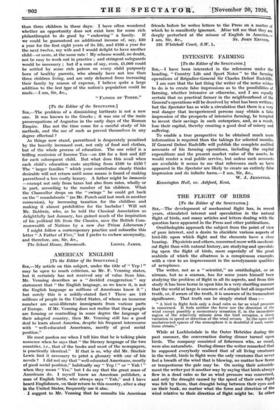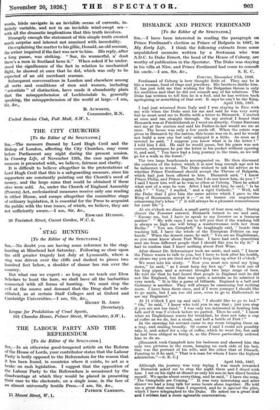THE FLIGHT OF BIRDS [To the Editor of the SPECTAToR.]
Sin,—The development of mechanical flight has, in recent years, stimulated interest and speculation in the natural flight of birds, and many articles and letters dealing with the question have appeared in the Press and other publications.
Ornithologists approach the subject from the point of view of pure interest, and a desire to elucidate various aspects of bird-life upon which flight and the elements have a close bearing. Physicists and others, concerned more-with mechani- cal flight than with natural history, are studying and speculat- ing upon the flight of birds, more especially of the great seabirds of which the albatross is a conspicuous example,
with a view to an improvement in the aerodynamic qualities of aeroplanes.
The writer, not as a " scientist," an ornithologist, or an airman, but as a seaman, has for some years himself been studying the problem of flight in all its aspects, and from this study it has been borne in upon him in a very startling manner that the world at large is unaware of a simple but all-important truth, or, if aware of the truth, it is unaware of its tremendous significance. That truth can be simply stated thus :-
" A bird in flight feels only a dead calm so far as wind pressure is concerned. It feels neither the force nor the direction of the wind except possibly a momentary sensation if, in the immediate region of the relatively minute area the bird occupies, a sharp variation in speed or direction of the wind occurs. In the open and unobstructed spaces of the atmosphere it is doubtful if such varia• tions obtain."
While at Lochboisdale in the Outer Hebrides during the past summer, the conversation during dinner turned upon birds. The company consisted of fishermen who, as usual, were also naturalists. During dinner the writer remarked that he supposed everybody realized that of all living creatures in the world, birds in flight were the only creatures that never feel a breath of the wind that is blowing, no matter how fierce or tempestuous the gale may be. On seeing their astonish- ment the writer put it another way by saying that birds always flew in a dead calm so far as wind pressure was concerned, and only the draught caused by the speed of their own flight was felt by them, that draught being between their eyes and on their beak, no matter what the force and direction of the wind relative to their direction of flight might be. In other words, birds navigate in an invisible ocean of currents, in- finitely variable, and not in an invisible wind-swept sea— with all the dramatic implications that this truth involves.
Strangely enough the statement of this simple truth created much surprise and interest not unmixed with incredulity.
On explaining the matter to his gillie, Donald, an old seaman, the writer inquired if the fact was new to him. His reply, after a long pause, was striking. " Sur, its wunnerful, a' doot there's a mon in Scotland kens it." When asked if he under- stood the significance of the fact in relation to mechanical flight, he showed at once that he did, which was only to be expected of an old merchant seaman.
Subsequent conversations in London and elsewhere among all sorts and conditions of men and women, including " scientists " of distinction, have made it abundantly plain that the misapprehension of Loehboisdale is, generally speaking, the misapprehension of the world at large.—I am, Sir, &c.,
B. ACWORTH,































































 Previous page
Previous page